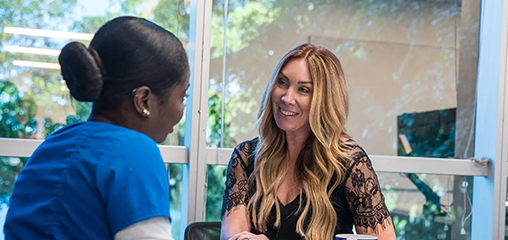
How to Become a Pediatric Nurse
Does empathy and patience come easy to you? Are you passionate about educating people and making an impact in the lives of children and their families? If you answered yes, then a career in pediatric nursing may be a great fit for you. In this post, we’ll look at what pediatric nursing is, key job responsibilities, work environment, and guidance on how to become a pediatric nurse. Let’s get started!
Pediatric Nursing: Career At a Glance
- Work settings: Clinics, hospitals, schools, doctor’s offices, and specialty care centers
- Job Outlook: 6% job growth expected over the next 10 years [1]
- Education Requirements: Obtain a nursing degree (Pediatric certification optional)
- Duties: Provides care for children from birth to 18 years of age
- Pros: High job satisfaction, job security, and fulfilling career working with children and their families
- Cons: Emotionally demanding, irregular schedules, and stressful environment
What is a Pediatric Nurse?
Pediatric nurses are registered nurses who care for children from infancy through adolescence. Pediatric nurses have specialized knowledge about the unique healthcare needs of young patients that continually change as their bodies develop and grow. Children are not simply younger versions of adults. Their bodies react to illness and injury in different ways, and pediatric nurses have been trained to provide optimal healthcare for their needs.
What Do Pediatric Nurses Do?
Depending on their specialty, a pediatric nurse may care for children dealing with everything from the common cold, to broken bones, to life-threatening illnesses. Throughout their work, they rely on expertise in childhood development, growth, and health issues.
Conducting routine health care check-ups is a common task in general pediatric care. For these visits, a nurse does a physical assessment and records the patient’s vital signs, height, weight, and other milestones to check on current health and developmental progress. Other pediatric nurse responsibilities include:
- Caring for acutely, chronically, or critically ill children
- Administering vaccines and immunizations
- Performing routine developmental screenings
- Interpreting laboratory and diagnostic tests results
Education is another key component of the job. Pediatric nurses educate parents on how to promote health and how to care for illnesses in children. In particular, pediatric nurses work closely with parents and caregivers of children with chronic illnesses or disabilities to ensure their child’s needs are met.
Where Do Pediatric Nurses Work?
You can pursue a pediatric nursing career in many healthcare settings, including clinics, general hospitals, children’s hospitals, doctor’s offices, and schools. Social services agencies, government agencies, and home healthcare agencies that serve children may also hire pediatric nurses. Pediatric nursing professionals can sometimes provide health services and education at community and school health events. Typically, pediatric nurses work with a healthcare team who also specialize in pediatrics or family medicine.
Types of Pediatric Nurses
RNs may choose from many pediatric nursing specialties. In hospitals, for example, a pediatric nurse may work in:
- General care for children with a variety of acute and chronic conditions.
- Critical care for children with critical or life-threatening conditions.
- Intermediate care for children who recently left critical care or are in a condition between critical and general care. In this role, nurses watch closely for early signs that an illness is worsening and are prepared to intervene quickly.
- Rehabilitation for children preparing to return to their home, community, and school and manage any remaining health issues.
Other types of pediatric nursing specialties include:
- Oncology: Pediatric oncology nurses care for children with cancer. They administer chemotherapy, provide education to families about managing the challenges of cancer treatment, and collaborate closely with oncologists to provide quality, compassionate care.
- Cardiology: Pediatric cardiovascular nurses care for children with heart conditions. They work with patients with complex cardiology needs, many of which require surgical intervention. These nurses provide post-operative care, educate families about the patient’s condition and procedures, and support families through treatment.
- Gastroenterology: Pediatric gastroenterology nurses care for children with gastrointestinal disorders. They possess specialized knowledge in conditions like celiac disease, Crohn’s disease, ulcerative colitis, and liver disease. These nurses assist in procedures like endoscopies, provide nutrition education, and collaborate with gastroenterologists and other healthcare professionals.
- Neurology: Pediatric neurology nurses care for children with disorders of the brain and spinal cord. They implement neurological assessments, assist with diagnostic tests like electroencephalograms (EEGs), and support families to enhance the patient’s quality of life.
- Endocrinology: Pediatric endocrinology nurses care for children with endocrine disorders, such as hormone imbalances, thyroid disorders, and diabetes. These nurses monitor blood glucose levels, provide education on hormone replacement therapy, and assess growth patterns.
Skills Needed to Be a Pediatric Nurse
A pediatric nurse must be competent in the basic skills essential to the nursing practice. In addition, a good pediatric nurse is strongly committed to child and family health. They think quickly and keep calm under pressure, not letting young patients see their stress or worry.
Strong communication and relationship skills are essential for interacting with parents, children, and other medical care professionals (e.g. primary care pediatricians, pediatric specialists). For starters, pediatric nurses must ease the fears and gain the trust of scared and nervous children.
 They also need to have critical thinking and creativity skills to adjust interactions with their young patients by age and developmental level, asking questions in a way that helps them get important information from children. Pediatric nursing professionals answer many questions from parents and children and explain illnesses, treatments, and medications. They aim to collaborate with parents in providing care, thus utilizing parents’ expert knowledge of their children.
They also need to have critical thinking and creativity skills to adjust interactions with their young patients by age and developmental level, asking questions in a way that helps them get important information from children. Pediatric nursing professionals answer many questions from parents and children and explain illnesses, treatments, and medications. They aim to collaborate with parents in providing care, thus utilizing parents’ expert knowledge of their children.
How to Become a Pediatric Nurse
While you have many options in becoming a pediatric nurse, the process may be a lot more straightforward than you think. Let’s dive into each of the key steps:
1. Attend Nursing School and Earn a Degree
Before becoming a pediatric nurse, you’ll need to earn a nursing degree to become a registered nurse (RN). You have essentially two options for becoming an RN: earn your Associate Degree in Nursing (ADN) or Bachelor of Science in Nursing (BSN). We recommend attending a nursing school with a BSN degree program, so that you’re equipped with a broad skill set and prepared for future nursing career advancement opportunities.
Most nursing school programs take 2-4 years to complete, with an ADN program taking two years and a BSN program taking three to four years on average. Some BSN programs like the one from Arizona College of Nursing enable you to earn your degree in 3 years or less with qualifying transfer credits.
Regardless of your school choice, they will all include clinical rotations in pediatrics. You will also have the chance to gain experience interacting with children in your clinical rotations in the emergency room, community health, school nursing, behavioral health, and maternal child health rotations.
2. Pass the NCLEX-RN Exam & Earn RN Licensure
After you complete nursing school, you’re ready to sit for the National Council Licensure Examination for Registered Nurses (NCLEX-RN) exam. You’ll submit your application to the state’s board of nursing. Once the board has received your application they’ll run a background check. Pending no issues with the background check you’ll receive a time and date to take the NCLEX-RN exam.
This is the official exam that all nursing students must pass in order to become a registered nurse and begin working in the field. The exam is pass / fail and includes between 85 to 150 questions. The test is adaptive, meaning the questions you receive will change depending upon your scores / answers throughout the exam process. You’ll receive at least 18 clinical judgement case study questions as part of the exam. After passing the NCLEX-RN, you’ll receive your official RN licensure from your state’s board of nursing.
For more information on the NCLEX-RN, visit the NCLEX site.
3. Gain Work Experience
Start working in a clinical setting to build your work experience and strengthen your nursing skills. We recommend choosing a relevant specialty, such as primary care, where you’ll interact with a wide patient population, including children and adolescents.
You can also choose to start your nursing career in a pediatric setting, such as a doctor’s office or children’s hospital. While a BSN degree can provide a solid foundation for pediatric nursing care, many organizations also offer additional training that can help you learn more knowledge about caring for children.
4. Become a Certified Pediatric Nurse
While it’s not mandatory to hold a pediatric nursing certification in order to practice as a pediatric nurse, it is recommended to complete it over time. Many employers want their nurses to become certified, and having a certification will make you stand out from competitors during the hiring process.
With sufficient experience in pediatric nursing, you will be eligible to take the certified pediatric nurse exam offered through the Pediatric Nursing Certification Board or the American Nurses Credentialing Center. The specific requirements vary depending on the certification, however you’ll need to have at least two years of nursing experience with a certain amount of hours practiced in a pediatric setting.
5. Pursue Continued Education
All registered nurses must complete a minimum number of continuing education unit’s (CEUs) every two years to renew their RN license. To stand out from your colleagues, consider attending pediatric nursing conferences, joining pediatric nursing professional organizations, and taking pediatric nursing continuing education courses.
Pediatric Nursing FAQs
How long does it take to become a pediatric nurse?
In general, it takes about two to four years, depending on the degree path, previous experience, and education. For example, those who pursue an ADN or attend an accelerated nursing program can become a pediatric nurse in two years. A BSN program usually takes three to four years for those without a previous degree.
What’s the difference between pediatric nursing and adult nursing?
While pediatric nurses perform many of the same duties as adult-care nurses, such as creating care plans and inserting IVs, there are some differences. Pediatric nurses focus on developmental screenings, fostering parent-child relationships, education on healthy lifestyles, administering childhood vaccinations, and monitor growth milestones.
Adult nurses may also specialize in a number of areas, such as palliative care, gerontology, rehabilitation, and mental / behavioral health. In adult care, more emphasis is placed on preventing chronic diseases and managing preventative care.
What skills do pediatric nurses need?
Pediatric nurses need both hard and soft nursing skills. They need to be compassionate, patient, flexible, stellar communicators, and have strong critical thinking skills. They need to be trained in the specialized care of children, possess knowledge of pediatric life support, be familiar with child growth and development, and competent in pediatric medication administration.
How much experience do I need to become a pediatric nurse?
Some employers will hire a new graduate nurse without previous nursing experience to work in a pediatric setting. Others will require a few years of clinical nursing experience. This criteria largely depends on the healthcare setting and facility.
Can I work in the Pediatric Intensive Care Unit (PICU) as a new grad?
In short, yes, but it depends on the healthcare environment. Many hospitals have a specialty training program made for new graduate nurses starting out in the PICU. For facilities without these programs, it’s highly likely that you will need to have one to two years of clinical nursing experience prior to working in the PICU.
Where do pediatric nurses work the most?
Pediatric nurses are most likely to be working in these healthcare settings: public schools, children’s hospitals, pediatrician’s offices, community health centers, pediatric specialty clinics, and pediatric home health care.
What are the challenges of working as a pediatric nurse?
Pediatric nursing can be an incredibly rewarding career — it can also be emotionally demanding. These nurses experience highs and lows. Seeing children seriously ill or injured can be tough to cope with day after day. Other challenges include difficulty communicating with younger children, managing the needs of both the patient and their caregivers, and working with vulnerable patient populations.
Start Your Future in Nursing Today

If you’re considering a career as a registered nurse (RN), Arizona College of Nursing is here to help you pursue your dream. Our BSN program enables you to earn a Bachelor of Science in Nursing in just 3 years or less with qualifying transfer credits. We’ve helped hundreds of students to earn a BSN degree and enter the nursing profession – and we’re ready to support you on your path to becoming an RN.
Why Choose Arizona College of Nursing?
- Earn a BSN degree in 3 years or less with eligible transfer credits
- Campus locations throughout the US
- Night classes for general education courses
- Hybrid Online/In-Person format for general education classes
- Nursing education is all we do
- CCNE-Accredited Program*
- NCLEX-RN success coaches and exam preparation class
- Financial aid available to those who qualify
Discover Your Path to a Career in Nursing
Information in this post is accurate as of July 9, 2024.
*The Bachelor of Science in Nursing (BSN) degree program at Arizona College of Nursing is accredited by the Commission on Collegiate Nursing Education (https://www.aacnnursing.org/). All Arizona College of Nursing and Arizona College campuses are institutionally accredited by the Accrediting Bureau of Health Education Schools (https://www.abhes.org/), a U.S. Department of Education-recognized accrediting agency.








